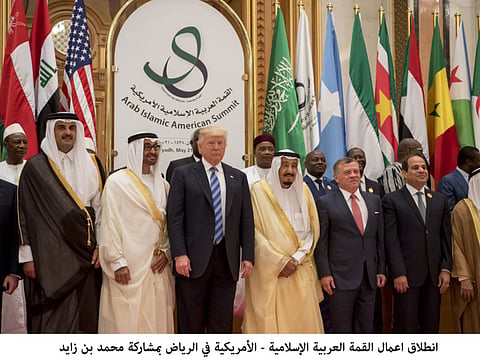The Middle East needs a back-up plan
Trump’s political fortunes at home may determine whether he can deliver on the commitments he is making abroad

As Donald Trump moves from the Middle East to Europe, many analyses will be written about the warm welcome he received on his arrival on Saturday in Riyadh, the $110 billion (Dh404 billion) arms sale agreement he and Saudi Arabia’s King Salman officially announced a few hours later and the speech Trump delivered Sunday to the ‘Arab Islamic American Summit’ meeting organised by his Saudi hosts.
Long before Trump’s arrival it had become clear that many Arab leaders have decided to look past the US president’s divisive rhetoric about Islam and Muslims and to seek common ground, particularly over Iran. Addressing the summit on Sunday, Trump offered what his hosts sought: an affirmation that America shares their view of Iran as the main threat to regional stability.
More than Trump’s prepared remarks, however, what ought to command our attention are his offhand comments during a series of photo-ops earlier in the day. As he met GCC leaders one-by-one, Trump spoke casually for a few seconds as the pictures were taken, and in each instance his unscripted remarks focused on security and arms sales.
“One of the things that we will discuss is the purchase of lots of beautiful military equipment, because nobody makes it like the United States,” Trump said while sitting beside Qatar’s Emir, Shaikh Tamim Bin Hamad Al Thani. “And for us that means jobs and it also means, frankly, great security back here, which we want.”
Security is important and the United States is not exactly a newcomer to the arms trade. It is worth asking, though, whether weapons sales and antipathy towards Iran are, by themselves, a solid foundation for long-term relations between Washington and the Gulf.
Indeed, if the relationship between Washington and the Arab world is now going to be mainly transactional (which seems to be Trump’s preferred approach to international affairs) it’s worth paying attention to Trump’s domestic problems, because his political fortunes at home may determine whether he can deliver on the commitments he is making abroad.
Much of what Trump is promising must also be approved by Congress. Presidents of both parties have discovered over the years that securing that approval can be very hard. For presidents who are in political trouble, it is exponentially more difficult.
Though planned well in advance, as all presidential trips are, Trump was surely glad to get away from Washington after a chaotic ten days set in motion by his firing of FBI Director James Comey. By the time he left for the Middle East a special counsel had been appointed to look into his 2016 campaign’s ties to Russia, Democrats were calling seriously for his impeachment and even a few Republicans were beginning to edge away from him.
In some respects foreign affairs can operate in opposition to domestic political crises. Foreign trips and deploying the military are well-established ways for an embattled president to project strength.
Richard Nixon made a triumphant tour of the Middle East, riding through Damascus in an open car in June 1974, less than two months before the Watergate scandal finally forced him out of office. The elder George Bush launched a major humanitarian intervention in Somalia after losing his 1992 re-election bid to Bill Clinton. Clinton solidified a historic peace agreement in Northern Ireland even as the Whitewater and Lewinsky scandals began to engulf his administration. He later launched a war against Serbia only weeks after being acquitted by the US Senate in his impeachment trial.
None of those things, however, had to be approved by Congress (the Serbia war probably should have been — but that is a separate discussion). It is very true, as Trump says, that arms sales create jobs at home (personally I’d argue that’s not a great reason to sell people weapons, but again, a separate discussion). By itself, however, that will not win him the votes he needs.
Even presidents who are riding high often have difficulty following through on the commitments they have made when it comes to aid, trade and arms sales. If the air of crisis around the Trump presidency continues to grow, fewer and fewer people on Capitol Hill will be inclined to do him any favours.
So the question going forward is not whether Trump and his Arab allies are on the same page but whether Trump can deliver.
Arab disappointment with America is nothing new. If history teaches us anything, it is the importance of having a back-up plan. So the question for the Arab world is what will it do if Congress does not approve the arms sales? If something in the news makes a country look suddenly ‘dangerous’ to Trump’s core voters? If negotiations over anything simply do not turn out as planned?
Everyone knows that Trump is erratic when it comes to domestic policy. If foreign policy proves to be no different — and why should it? — does the Middle East have a back-up plan?
Gordon Robison, a longtime Middle East journalist and US political analyst, teaches political science at the University of Vermont.



